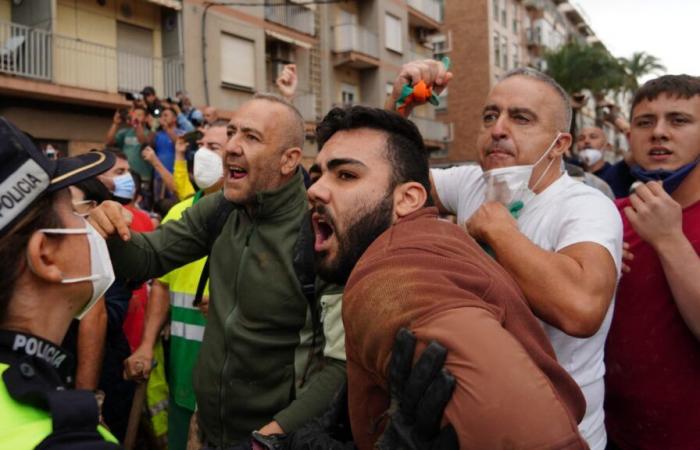This Sunday afternoon, King Felipe VI as well as the head of the Spanish government were the targets of insults during their visit to Paiporta, one of the municipalities most affected by this week’s floods.
A crowd shouting “Assassins! Assassins!” and other insults, objects and mud ending up on the faces and clothes of the Spanish royal couple. The images of the visit to Paiporta of King Felipe VI and Queen Letizia, who were accompanied this Sunday, November 3, by Prime Minister Pedro Sánchez and the President of the Valencia region Carlos Mazón, struck people’s minds. Above all, they testify to the frustration, deep anger and despair of the inhabitants of southeastern Spain, where more than 200 people lost their lives in this week’s floods.
“I’m angry but it’s not just me”, testifies Lucia at the microphone of BFMTV in Paiporta, who considers “normal” the fact that Felipe VI was taken to task. “Everyone here is angry at the government of the Valencian community and the central government of Spain because they have abandoned the people.”
A Frenchwoman living in Valence for 25 years, Stéphanie shares this feeling of having been “completely abandoned” like other residents of Chiva, a town also hit by floods where the king was supposed to go in the afternoon. A visit ultimately canceled after the incidents that occurred in Paiporta. If the sovereign had come, Stéphanie does not think he would have been better received.
“They left us to die like dogs,” she says. “Everyone says he’s a murderer because they didn’t do anything. They should have planned all this.”
“After three days, the army was not there”
Because some of the strong criticism aimed at the authorities relates to the delay it took for the regional government of Valencia to send a telephone alert message to residents on Tuesday, the day when torrents of water fell on the south- east of Spain. “They didn’t warn us so that people could take shelter in a certain way, in higher places,” explains Stéphanie. “We find it shameful.”
The other subject at the heart of the controversies is the slowness of relief operations. In Paiporta, Omar and Maria, especially angry with the government, have difficulty understanding why “after three days the army was not there. They should have mobilized the military.”
“It’s Sunday and the soldiers arrived yesterday. It happened on Tuesday evening!”, emphasizes Lucia.
“We started seeing the army yesterday and we saw a lot of helicopters, but no help,” adds Stéphanie. “It was the neighbors who helped each other. It was really thanks to everyone’s humanity that we were able to get by, eat, drink. Otherwise there was no one to help us.”
After the incidents that marked his visit to Paiporta, Felipe VI declared that it was necessary to “understand the anger and frustration” of the people affected by the floods. Prime Minister Pedro Sánchez also said he understood the “anguish and suffering” of the flood victims, but condemned “any type of violence”.






